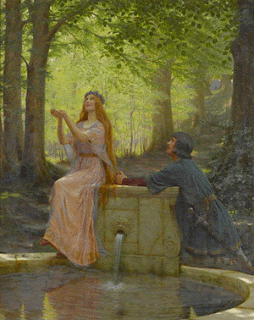 The Cossacks
The Cossacks by Leo Tolstoy
"When he compared these people to himself, they seemed so strong, wonderful, and free that he felt ashamed and unhappy. He often considered throwing everything to the wind and registering as a Cossack . . . But an inner voice told him to wait. . . He was held back by the thought that happiness lay in selflessness." (p 110)
This is the story of Olenin, a Romance in the mountains. Olenin, young, naive, and wealthy Russian goes to the Caucasus to fight with the Cossacks. Just as he leaves his home he leaves civilization behind for the romance in the mountains under the infinite and interesting sky. "The further Olenin traveled from the heart of Russia, the more distant all his memories seemed, and the nearer he drew to the Caucasus, the lighter his heart became." (p 13)
Olenin is a searcher, in one sense a distant relative of Pierre Bezukov and in another a stand-in for Tolstoy himself. In the story his identity becomes an issue for him to deal with as he tries unsuccessfully to become like the Cossacks as he joins their battle against the Chechens. Another young noble, Beletsky, joined them and lived a more carefree, even licentious, lifestyle. Yet the Cossacks "got used to him, and even liked him better than Olenin, who remained a mystery to them." (p 98)
Olenin would go off alone in the countryside to ponder life, and even has an epiphany that leads him to conclude, "I still have to live, have to be happy. Because there is only one thing I want--happiness . . . I still need to live the best way I can." (p 83) Even after this epiphany Olenin has difficulty acting in a way that truly leads him toward this "happiness" that he desires. He also becomes enamored of a young girl, Maryanka, but is unsure of how to approach her and is unsuccessful in that pursuit.
As the Cossacks battle the Chechens with Olenin joining in the reader begins to wonder if he is really naive or simply superior (even if he is unwilling to admit that to himself). He demonstrates a sort of stoical selflessness that carries him on his journey; but he remains a class apart, out of his element and unable to reach his ultimate goal. He remains solitary, watching the others with a bemused air regarding everything around him. The story ends with Olenin still a Russian, unable to become a Cossack, yet unwilling to give up his dreams.
Tolstoy's writing in this novella is comparable to his great novels, in fact he began writing War and Peace immediately following this story. He achieves a feeling for the Cossacks that reminds me of that demonstrated by Gogol in his novella Taras Bulba. Finally, he explores the themes of love and death and the search for identity and meaning in one's life that the reader is accustomed to encounter in his novels and stories.
View all my reviews










